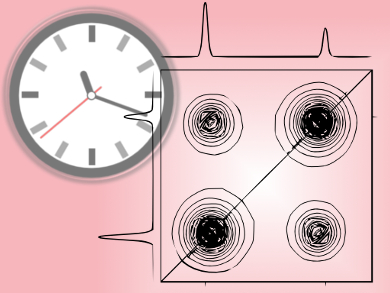The NMR technique, especially 1D 1H NMR, is widely used for conducting in situ mechanistic and kinetic studies of chemical reactions. However, there are occasions when 1D NMR cannot provide sufficient information, but 2D NMR usually takes too long for such studies.
By applying compressed sensing, a signal processing method that can restore spectra from fewer measurements to 2D NMR, Lynn F. Gladden and colleagues, University of Cambridge, UK, may help solve the dilemma. Their method has significantly shortened the acquisition time of 1H-1H COSY NMR, which enabled them to study the kinetics of Meerwein−Ponndorf−Verley reductions as well as to characterize intermediates and products. This new approach, while time-saving, still retains the temporal resolution of NMR. It is also generally applicable to any other 2D NMR experiments.
- In situ study of reaction kinetics using compressed sensing NMR,
Yuting Wu, Carmine D’Agostino, Daniel J. Holland, Lynn F. Gladden,
Chem. Commun. 2014.
DOI: 10.1039/c4cc06051b




